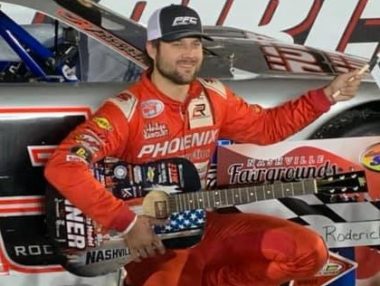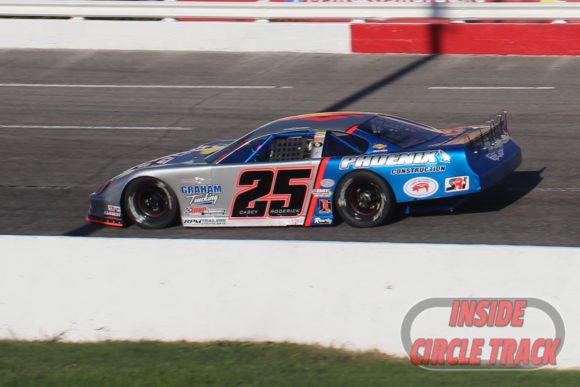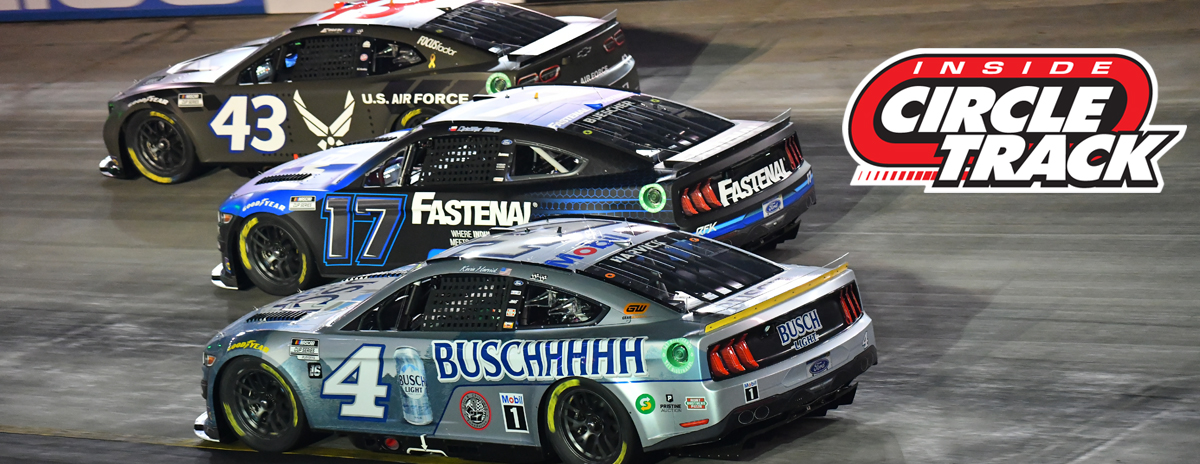
Casey Roderick
This is the first of a two-part story from our interview with Casey Roderick. The second story will be posted prior to the Snowball Derby.
On November 2nd of this year, Casey Roderick scored one of the biggest wins of his racing career when he steered his Super Late Model machine under the checkered flag in the All-American 400 at the historic Nashville Fairgrounds Speedway. But it was more than just another win for the Lawrenceville, GA driver. The emotional victory served as proof that the 28-year-old racer could not only succeed at short track racing’s highest level, something that was already known, but it showed that the former Southern Super Series champion could make his own way in a sport that had previously forced him to rely heavily on others for success.
After parting ways with car owner Ronnie Sanders during the 2019 season, Roderick had taken different rides in an attempt to remain competitive and relevant in the sport. Last year in this same race he drove a car out of the Donnie Wilson stable to a seventh-place finish. But this year was much different as the No. 25 ride he piloted to the front of the field late in the going of the crown jewel race was his own.
Casey Roderick Motorsports fields a Rowdy Manufacturing car with backing from Toby Hodge of Hodge Sawdust and Shavings as well as James Finch’s Phoenix Construction. His victorious run in the All-American 400 was only Roderick’s fifth time out as a team owner.
The mindset of this driver/owner was boosted by his team’s performance in Nashville.
“I’ve got a lot of confidence built up in my ability to be a car owner, crew chief, driver, and whatever else,” Roderick declared in a telephone interview with InsideCircleTrack.com. “That combination of things all coming together like it did, I feel like we did the very best we could and we pulled it off. I’m very thankful to have the people who come to the race track with me to help me. Without those guys, I wouldn’t be able to do this at all.”
The team model of having part-time help appears to be fading away in this form of racing here in the modern era.
“It’s a different world out here today in Late Model racing,” Roderick explained. “We’ve got full-time crews that work during the week on the cars, at least certain teams do. I kind of like the old school way, just get a good group of guys together who don’t do this full-time and just do the best you can. I’m having to do a lot of it as far as calling the shots myself and it’s a whole different task than what I’m used to as far as being a car owner. I’m still getting used to that process of it, but I learned a lot at the All-American 400 as far as what we need to work on and what we did good on. I’ve got some notes down on some paper and we’ll try to make it better for the Snowball Derby.”
Please also consider reading “How young is too young to drive a Late Model“
Although Roderick has won big events like the Rattler 250 at South Alabama Speedway in 2014 and the final World Crown 300 at Gresham Motorsports Park that same year, he has faced a great deal of uncertainty over the past year.
So is it accurate to say that each time he takes to the track Roderick is fighting for his racing life?
“That’s very accurate,” he agreed. “I’ve had a lot of ups and downs in my racing career. When Ronnie(Sanders) and I split ways, I didn’t really know what was going to happen. I didn’t know if I was going to be able to race anymore. I had been wanting, over the last couple of years, to work toward getting my own program together.”

Casey Roderick’s No. 25 Rowdy Manufacturing car
He has even considered taking drastic measures to remain connected to Late Model racing.
“I’ve had some thoughts of maybe renting my car out and kind of staying in racing that way and maybe make a little money if I could,” the former Bill Elliott Driver Development program driver said. “There’s a lot of thoughts that have gone through my head and I think that’s why I was so emotional after that race. I’ve been trying to win these races for years and I’ve led a lot of laps and been in position but a lot of things have taken me out of contention. But I finally pulled it off in my own car.”
The All-American 400 win was the culmination of much effort on the part of Roderick and those who have assisted him along the way.
“That meant a lot to me and it meant a lot to all of the guys that were there helping,” he recounted. “They know what I’ve been through and how hard I’ve had to fight to be able to still race. I think that’s the biggest thing. My family doesn’t have the money to go out here and race like I want to and I’ve always had to rely on other people once I got up to the Late Model level and beyond Late Models. To pull a big win off like that in my own stuff that I’ve worked really hard for and tried to put together the best I could meant a lot.”
Success came early for Roderick. And it looked as if he might very well be headed straight for the top of the sport. After winning an ARCA Menards Series event in 2010 at only 17 years of age, this driver appeared to be a can’t miss prospect. But as is so often the case in the upper levels of racing, finances became a factor.
Does the fact that he may have missed a chance to move further up the ladder because of money frustrate Roderick?
“It does,” he admitted. “I think about it everyday to be honest with you. There’s not a day that goes by that I don’t think about it. My heart is in racing, I’ve done it my whole life. I could be up there doing it on Sunday if the right opportunity came about. I have full confidence in myself that I could do it and it’s nothing against the people that are taking those rides away from me but the people who paid their way to the top are taking all the seats. That’s not necessarily the talent that deserves to be there with certain ones without mentioning any names. I think a lot of people would agree with that.”
Please also consider reading “Bubba Pollard voices views on the state of short track racing“
Roderick, like so many involved in racing, laments the fact that those who have access to finances bypass those who may have more talent.
“There’s a lot of good talent out there that never gets the opportunity,” he pointed out. “I have been able to run a few NASCAR races but it was all low budget so I wasn’t with the top teams that are capable of winning. I think that had a lot to do with some of the emotion I had after Nashville as well, just knowing I can do this. I probably was the only car there where the driver is doing most of it. I called my own shots, called my own adjustments, I tuned the car myself in practice. I don’t have anybody there that I’m paying who’s there to do it for me. I think winning that race, with all that being said, I knew I had the talent to do it and I knew what I needed in my car to get it to drive better. It’s frustrating that someone like that can’t get an opportunity because that’s who needs to be in NASCAR, people who can do that. But it’s a whole different world today. You’ve just got to take your punches and keep rolling, look forward and hold your head up and that’s what I’ve been doing. That’s why I feel like a lot of the emotion came out.”
Richard Allen is a member of the National Motorsports Press Association
Respond to this piece on Twitter –> @RichardAllenIDR
or on Facebook –> InsideCircleTrack/Facebook
